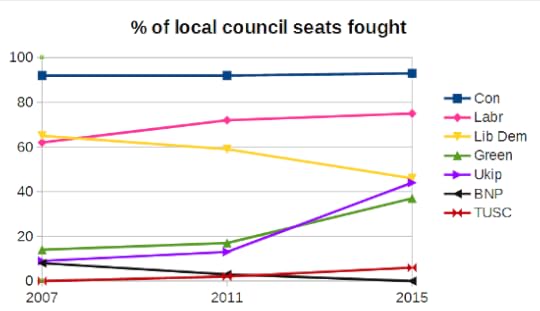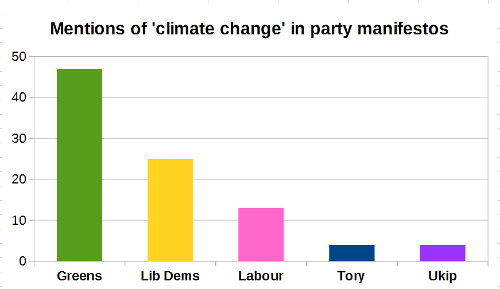Bernard Deacon's Blog, page 66
April 28, 2015
BBC South West and the election
Local BBC TV has two outlets for its election coverage. First, there’s the daily dose of ‘news’ on Spotlight. I’d meant to monitor that but what with a couple of attacks of nausea and falling asleep in the first week, the project disintegrated as the will to live was rapidly lost. Which leaves the Sunday Politics South West show. There have been four offerings of this since the election campaign began. So what does it tell us about the BBC’s approach to the elections in Cornwall and Devon? The first conclusion is that Cornwall-based candidates do rather well, being given considerably more than their fair share of airtime. One can only suppose that this is because the BBC insists in claiming that coalition-coalition ‘marginals’ are somehow of great relevance to the election outcome. Whatever, of the 15 candidates invited to appear on the show (including the upcoming one next Sunday) we find that nine are based in Cornwall and only six in Devon, despite there being twice as many seats east of the Tamar. 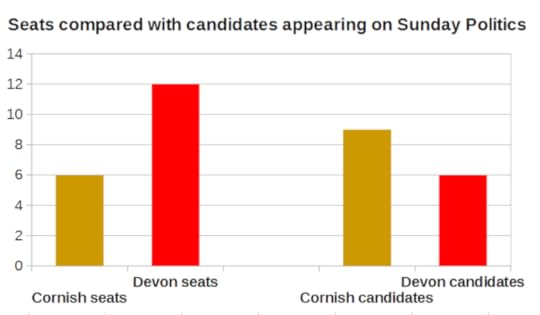 Two Tory candidates, one each from Labour, the Greens and Ukip and an incredible four of the six Lib Dem candidates in Cornwall have or will appear on the show. By constituency, four of the six candidates in Camborne-Redruth have been offered a place on the programme. St Ives has seen two of its candidates, while the other four seats have had one of theirs appear. Adding in the Devon-based candidates, we have a total of four Tories, four Lib Dems and four Labour, two from Ukip and one Green. Given their polling strength in Cornwall and Devon, the Lib Dems and Labour seem to have come out best. Overall, the total coverage (expressed purely in the number of seconds allocated to party spokespersons speaking) for the first four shows broke down as follows.
Two Tory candidates, one each from Labour, the Greens and Ukip and an incredible four of the six Lib Dem candidates in Cornwall have or will appear on the show. By constituency, four of the six candidates in Camborne-Redruth have been offered a place on the programme. St Ives has seen two of its candidates, while the other four seats have had one of theirs appear. Adding in the Devon-based candidates, we have a total of four Tories, four Lib Dems and four Labour, two from Ukip and one Green. Given their polling strength in Cornwall and Devon, the Lib Dems and Labour seem to have come out best. Overall, the total coverage (expressed purely in the number of seconds allocated to party spokespersons speaking) for the first four shows broke down as follows. 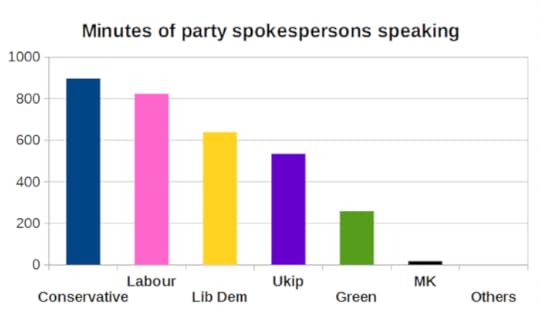 If we convert this to percentages and then allow for the over-representation of Cornish seats in the show, and go on to compare that with the number of candidates, we get the following percentage breakdown …
If we convert this to percentages and then allow for the over-representation of Cornish seats in the show, and go on to compare that with the number of candidates, we get the following percentage breakdown …
Airtime
Candidates
Conservatives
28.3%
16%
Labour
26.0%
16%
Lib Dems
20.2%
16%
Ukip
16.9%
16%
Greens
8.2%
16%
MK
0.6%
9%
SNP/PC
0.0%
12%
There seems to be a bias towards the two bigger Westminster parties, while the Lib Dems and Ukip also get more than their number of candidates should entitle them to. The Greens don’t get their fair share of airtime. Meanwhile, neither does MK, which is almost invisible. Indeed, anyone relying on the BBC for information might be surprised to discover they’re standing in this election. They’d also be astonished to find that there are 12 other candidates, including three TUSC/Left Unity and two Communist Party candidates in Devon, one from the National Health Action Party in Cornwall and another half a dozen assorted Independents and odds and sods. Moving from quantity to quality, let’s review the four programmes we’ve had to endure. On the first (28th March) Phil Hutty for the Lib Dems was a bit out of his depth, admitting that his party would ‘take a hit’, a rather pessimistic conclusion one might have thought with over four weeks of the campaign still to go. There was some discussion of planning and neighbourhood plan referenda. Apparently, these are examples of ‘devolution’. Although the presenter did introduce this by the comment that the word ‘devolution’ conjures up an ‘image of nationalists in Scotland, Wales and yes, those in Cornwall waving flags and giving the English a hard time’. Thanks to the BBC for summing up SNP/Plaid and MK polices so succinctly. The possibility of a Cornish Assembly with powers over planning was raised in passing, although Phil Hutty wouldn’t promise any extra money for it, thus rendering it pointless given the level of Lib Dem/Tory cuts.
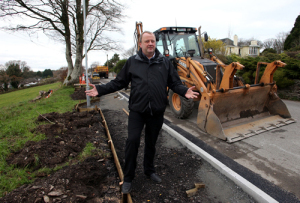 MK’s Andrew Long: seen but not heard, or even named
MK’s Andrew Long: seen but not heard, or even namedOn the 12th April there was a piece on Declan Lloyd, Labour’s candidate in South East Cornwall, one of the youngest standing in the election. Declan had not appeared at a hustings, having gone on holiday with his mum instead. As the date of this election has been known since 2010, this seems an odd choice of holiday date. Although Declan might be forgiven as he was of course only 14 in 2010. No matter, as the hustings was shown it was stated that all the candidates for the other parties, including MK, were there. MK’s candidate Andrew Long was briefly seen although not named. The piece then interviewed three of the candidates about the missing Labour lad – but not Martin Corney of the Greens or Andrew Long. Corney was then mentioned by name but it was a case of seen, but not heard, or named, for Long. His name didn’t even appear on the list of candidates shown at the end of the piece!
 MK’s Dick Cole: less time than Cameron
MK’s Dick Cole: less time than CameronOn the 19th a Cornish Assembly and affordable homes were among the topics. Any fair-minded and objective observer might have thought that here at last was a chance for the distinctive voice of MK to be heard on these issues. And yes, here was Dick Cole of MK, introduced inaccurately as the leader of ‘the Cornish nationalist party MK’, being interviewed. But not live in the studio. Instead he was given a generous 19 seconds to camera somewhere near St Dennis. That’s half the amount of time given to David Cameron, not believed to be standing in Cornwall. Discussion of a Cornish Assembly was left to Scott Mann of the Tories, Simon Rix of the Lib Dems and, peculiarly, or perhaps not given their outright opposition to it, Bob Smith of Ukip. Rix condemned MK’s plans as ‘too expensive and too extreme’, preferring more powers for Cornwall Council with devolution to town and parish councils. There was then some insipid discussion of affordable housing, with an interview piece informing us that the ‘biggest problem’ in Cornwall was the way nimbys prevent thousands of much-needed houses being built. This gem emanated from an estate agent in west Cornwall, one of those who definitelty have much need for more houses. No-one present cared to mention the need to meet developers’ profits first in the present failed market system. And second homes only briefly disturbed the screens, mentioned (by Rix) right at the end of the discussion.
 MK’s Loveday Jenkin: rendered anonymous by BBC
MK’s Loveday Jenkin: rendered anonymous by BBCLast Sunday on the 26th we again had the spectacle of presenter Martyn Oates refusing to name an MK candidate on air. Loveday Jenkin was transformed into just an anonymous ‘opposing candidate’, despite being at the receiving end of one of Michael Foster’s alleged anger management problem episodes. The Greens’ Tim Andrewes had been invited onto this show, the first topic of which was defence. He was then duly lectured by the pair of pompous right wing Labour/Tory candidates for his ‘pie in the sky’ temerity, for daring to propose that this fine country of ours could possibly survive without Trident and the ability to blow Russia or Iran to kingdom come, as well as the rest of us. We might have no money, a point made several times by the Tory, but can apparently still afford to spend billions on nuclear bombs. As soon as Andrewes made the point that austerity was a political choice he was unfortunately cut off and the ‘regional’ opt-out abruptly terminated. Phew, narrow escape, almost a glimpse of a real issue there. (And again, did I miss the discussion of global warming or environmental issues?)

April 27, 2015
The curious case of the vile rant in Camborne & Redruth
At the weekend the Daily Mail came up with a scurrilous story. Frankly, it’s not fit to sully our good Methodist ears here on a respectable site like this. But it can be read here. It was later picked up by the West Briton and their version is online here. Basically, it claimed one of the candidates in Camborne and Redruth resorted to a barrage of foul-mouthed abuse when it was pointed out by another candidate during a debate on the mansion tax that his address in Porth Navas was a £1.5 million waterfront house (with 400 foot of frontage and its own private wood). The candidate had, the Mail alleged, threatened to ‘destroy’ the candidate who brought this up.
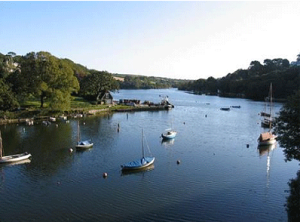 Nice view
Nice viewThe candidate accused was coincidentally booked to appear on the BBC’s Sunday Politics South West show yesterday. He was questioned about the Mail piece and his alleged comments. The exquisitely dressed Martyn Oates put a direct question to him. ‘Did you say that’. The answer was somewhat circuitous. ‘There is absolutely nothing in that article with which I agree’. A simple ‘yes’ or ‘no’ would surely have sufficed. Oates then dropped the issue.
It appeared that the accused candidate was reading from a prepared statement as he was looking down and wearing his reading glasses, which he then removed once the topic had ended.
Following official BBC electoral fairness guidance, Oates wasn’t able to name the other candidate, allegedly the victim of this supposed tirade or the party they represent. It was just ‘an opposing candidate’. However, I can here reveal it was the MK candidate.
If the accused candidate did not say what the Mail reported then he’s implying the story was a pack of lies (not unusual for the Mail it must be admitted) but also that the MK candidate, who is directly quoted by the Mail, is a liar. This is a very serious accusation. But one that could also be easily cleared up. If it was all nonsense, does the MK candidate agree? Has any journalist actually asked her if the story is true or whether she was misquoted? Or asked the other candidates present at the hustings if they heard any of this appalling language?
While on the subject, it’s interesting to note that the house under question, designed in 1985 by architect Roger Hocking, seems to be listed in the current 2015 Cornish Holiday Cottages Guide, while in 2012 it was being advertised as a dog-friendly self-catering holiday home.

April 26, 2015
The sealed train election
It’s been a strangely muted week. Outside Scotland there’s little energy. All vision seems to have been crushed by the narrow beancounting approach of the media, which has predictably fallen into the Tory/neoliberal trap of reducing politics to cost-benefit analysis.
Refusing to discuss their austerity policies or the precise nature of the further cuts they collectively plan, Cameron, Clegg and Miliband stumble on aimlessly towards the electoral horizon. Labour offers us a Tory manifesto; the Tories a Labour one. Cameron is one day in Cornwall promising countless thousands of jobs and apprenticeships and later in the same week he’s in Croydon promising countless thousands of jobs and apprenticeships. Clegg exists in a sepia-tinged retroworld where people still vote Liberal Democrat and indulges in increasingly bizarre and impossible promises as if to trigger some reaction from a soporific and sated electorate.
The whole tired leadership caravan rumbles on in its sealed train across the deserted and featureless election campaign landscape of neoliberalism. Cameron and Miliband refuse, for the fist time since 1974, to do a BBC Radio 4 Election Call, Cameron avoids TV debates much as the landed classes avoided lepers in the 14th century. His team refuses to allow a candidate from the National Health Action Party to appear with him on the same hustings in Tory Oxfordshire. He in particular is ensconced inside a tight security cordon where potential naysayers are ruthlessly ejected. Unscripted encounters with real voters are as rare as snow in Cornwall.
Meanwhile, the lumpen masses gaze on at the spectacle passively and rather contentedly (at least those most likely to vote are contented, the others haven’t bothered to register). They’re determined to slumber on until polling day when the whole embarrassing charade thankfully ends. Some of course received their postal ballot this week and, unable to summon up enough energy to stagger down to the polling booth or otherwise suffering from voter fatigue – poor dears – have already voted. Actually, quite a lot may have. Up to a fifth perhaps in Cornwall, where the proportion of postal votes cast in the last election ranged from 16.6% in Truro to 25.7% in St Ives.
 Tory view of the SNP
Tory view of the SNPNot even the Tories’ attempts to don the cloak of English nationalism and paint the SNP as a more ferocious version of the wildlings from the frozen lands north of the Wall in George Martin’s Game of Thrones is unable to nudge the polls in their direction. Only something like a sudden Greek exit from the Euro when they fail to make their next IMF payment this coming Friday is likely to have much impact.
The polls are immobile. In the equivalent week of the 2010 election they shifted by 12.9%. This past week they’ve only budged by 1.3%. Unlike then, when they yo-yoed wildly up and down, this time they betray a solid stability, or should that be stolid indifference. The much touted most exciting election since 1886 is turning out to be a damp squib, crushed in the machine of control politics.
w/e April 26
w/e April 19
change
Conservatives
33.4%
33.4%
nc
Labour
34.6%
34.9%
-0.3%
Lib Dems
7.7%
7.9%
-0.2%
Ukip
13.3%
13.3%
nc
Greens
5.4%
5.1%
+0.3%
SNP/PC
4.9%
4.6%
+0.3%
If anything, it looks as if, over the past three weeks, the Westminster clique’s efforts to squeeze the challenger party vote has failed dismally. The combined vote for the three old parties is now two percentage points lower than it was at the beginning of the month, while that of Ukip, the Greens and the nats is two points higher. And in Scotland, Labour’s nemesis rolls ever closer as the SNP’s lead over them is now one point larger even than it was three weeks ago.

April 25, 2015
Party donations in Cornwall update
Back in February I revealed the sources of local party donations received in 2014. I’m updating that blog here and extending the coverage back to January 2011, although that earlier piece contains some information not repeated here, for instance about individual donors in Cornwall. All donations to a constituency party above £1,500 have to be reported to the Electoral Commission. The following analysis is based on details of donations provided on the Commission’s website for the period from 1st January 2011 to now.
Here’s the headline picture by party.
Donations of £1,500+ Jan 2011-Jan 2015
Type of donor
Conservative
Liberal Democrat
Labour
Ukip
Greens
MK
Local individuals
£16,287
£64,858
£2,500
none
none
none
External donors
£38,436
none
none
none
none
none
Companies
£14,188
£2,000
£119,121
none
none
none
Total
£68,911
£66,858
£121,621
none
none
none
While the Greens and MK turned to crowdfunding to fund their campaigns we can see why the three Westminster parties didn’t need to bother with such small stuff. Nonetheless, there are interesting differences between the three neo-liberal, centr[al]ist parties. For instance, 44% of Tory donations came from outside Cornwall. The United and Cecil Club gave £5,000 to Steve Double’s campaign in St Austell and Newquay, another £5,000 to Derek Thomas at St Ives and £2,100 to George Eustice in Camborne and Redruth.
This organisation is described as ‘low profile’ and is registered at a stables in Iver, Bucks run by a former tobacco lobbyist. It’s also the bunch that organised a Tory fundraising bash in Knightsbridge, estimated to have raised at least £100,000 from the assorted super-rich who attended. Basically, it’s a conduit for channelling cash to Tory marginals, in the process providing some anonymity for its donors. Steve Double has also been boosted by another £4,187 from the Tandridge Club, another shadowy organisation based in Surrey and one with presumably the same function as the United and Cecil Club.
Nevertheless, the Tories receive the bulk of their local donations from local party organisations, although this was heavily concentrated in just two constituencies – St Austell and South East Cornwall. The rest came from companies. George Eustice at Camborne and Redruth was presumably grateful for £2,000 from FalFish, of Cardrew Industrial Estate, Redruth. Meanwhile, the Offshore Group of Newcastle (north of Bude), a firm involved in offshore oil and gas and renewable energy gave £10,000, split evenly between Sarah Newton at Truro and Sheryll Murray in South East Cornwall. With no obvious connections with Cornwall the fact that this compnay chose to support the two Tories best placed to retain their seats may be interesting. Not much chance of getting Sarah and Sheryll voting to stop further public subsidies for offshore oil and gas exploration then. Sarah was also given £2,188 by the local branch of London investment company FC Fund Managers.
What about the other wing of the coalition Government, the Lib Dems? Only Andrew George at St Ives has received a donation direct from business. He got £2,000 from the Chadwick brothers of Falmouth, who own the fashion firm Seasalt. The other Lib Dem candidates, while rather surprisingly funded overall almost as well as the Tories, seem to be dependent on individuals rather than businesses or organisations. But the vast bulk of the money collected for the Lib Dems was in just two constituencies – St Austell and Newquay and Camborne and Redruth. Rather curiously, in marginal North Cornwall neither Lib Dem incumbent nor Tory challenger seem to have been recipients of any donations since 2011.
But the really big money locally has been flowing to the Labour Party. Or more precisely one Labour candidate – Michael Foster at Camborne and Redruth. His campaign has benefited from £119,121 of donations over the past year, £42,727 to pay for ‘administrative services’ and £76, 392 described as ‘other’, maybe including payment for the rather well-produced newspapers which have been regularly falling onto local doormats over the past year.
This money all comes from Fostermco Ltd, whose sole director is – you’ve guessed it – media entrepreneur and millionaire Michael Foster. The company appeared to have had a paid up capital of ten pence in June 2014. This self-proclaimed ‘new’ sort of politician actually seems to have reverted to the rather old 18th century practice of buying your constituency. Fostermco has also given £191,766 in cash donations to central Labour Party funds in the last couple of years, as well as £4,000 to Enfield North and £1,000 to Finchley CLPs.

Voting reform. What are the prospects?
The old parties these days operate a tacit second preference voting system. It works like this. They urge us not to vote for our first choice, but for our second choice, in order to prevent our 3rd, 4th, 5th or 6th choice getting in. This seems to complicate matters unnecessarily. Especially as there’s a simple solution, which most European countries adopted decades ago. A proportional voting system would mean all votes counted rather than only the 200,000 or so swing votes in marginal constituencies.
So what are the parties saying about our antiquated Victorian voting system?
The Tories like it. Instead of reform, they want to make votes of equal value by implementing the boundary changes agreed but blocked by the last Parliament. Coincidentally, these boundary changes, involving an unwieldy shuffling of constituencies every five years, would benefit the Tories. And in an even more brazenly skewed proposal, they want more of the five million Brits who live abroad to vote in Britain, especially those ex-pats who’ve chosen to live in Spain or wherever for more than 15 years. On the other hand, they say nothing about the estimated seven million Brits who live in Britain, yet are not registered to vote.
Labour also sees nothing wrong with first past the post but supports lowering the voting age to 16 (as do all the other parties apart from the Tories). They also want to restore the block registering ended by the individual registration system brought in by the Tories and Lib Dems.
MK strangely omits to mention the voting system in its manifesto.
Ukip actually has quite a sensible position on this issue. It wants a proportional voting system without going into details and the removal of postal voting on demand.
The Greens call for the additional member system for parliamentary elections as part of a move to a written constitution. This is the same system as that used for elections to the Welsh Assembly and Scottish Parliament. It’s proportional but entails fairly large voting areas.
The Liberal Democrats have the most radical policies on voting reform. They want the single transferable vote (as in Ireland, Stormont and Scottish local elections) for both parliamentary and local elections. STV for local elections would be an excellent start, introducing voters to the system. The Lib Dems’ problem however is credibility. The obvious question is why didn’t they demand STV in local elections as part of the price for joining the austerity coalition? Instead, they allowed themselves to be fobbed off with a pathetic alternative vote referendum. If they couldn’t do it when they had the chance last time, then in what circumstances would it happen this time?

April 24, 2015
What the English local election candidate numbers tell us
Fixated by Westminster elections, the media usually measure the health of a political party only by the number of MPs it has or the donations it can beg. But there is another possible measure. Local elections are a more sensitive barometer for gauging the ability of parties on the ground to organise themselves, persuade people to stand for them and generally enthuse their activists. If a party is under the weather the number of candidates it stands tends to slip. If its morale is good, its activists confident and motivated, then it can more easily stand and support candidates.
In most parts of England local council elections will take place in two weeks time in parallel with the main action. So what do the nominations tell us? There are 9,283 seats up for grabs this time. If we compare the number of candidates the parties are fielding this time with the last round of equivalent local elections in 2011, we find that the Tories are standing roughly the same number. Whatever happens to the other parties, the Conservatives have been a frighteningly consistent presence since the 1880s and the days of Lord Salisbury. The vast majority of local election voters will, just like their grandparents be presented with a local Tory to dutifully vote for. In fact scores of them have already been returned unopposed in some more rural district councils.
Labour has recovered from its low point at the end of the Blairite years. But it still manages to leave a quarter of seats uncontested, mainly in the south of England. Nonetheless, its candidate numbers are up from last time by 140.
Then there’s the Lib Dems. Where’s the hanky? Their candidate numbers have fallen by a massive 1,282 to just under 4,300, fewer than half the seats available. The slide that began in 2011 after joining with the Tories has accelerated in pace. Depending on the outcome of the general election and whether it dooms us to another dose of Lib Dem Toryism, the dwindling band of Liberal Democrat ‘activists’ may soon be staring into the abyss. From having more candidates than Labour in 2007 the Lib Dems have slipped to the level of Ukip. Indeed, they only just retained their third place and in many parts of England are outnumbered by Ukip and Green candidates.
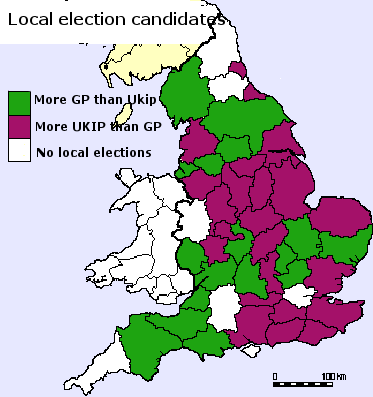 The geography of the challenger parties
The geography of the challenger partiesThese two challenger parties have increased their candidate numbers hugely. Ukip has almost matched the Lib Dems, standing nearly 4,100 candidates, while the Greens are contesting 37% of the seats. Both these parties have more than doubled (in the case of Ukip tripled) their candidate numbers this time.
Meanwhile, a third challenger party, largely being studiously ignored by the media, the Trade Unionist and Socialist Coalition (TUSC) is mounting the biggest socialist local election intervention for years. Together with the fledgling Left Unity (several of whose 21 candidates are on a joint ticket with TUSC) they are standing 585 candidates, a large increase on the 156 of 2011. As the left shows some signs of life, the collapse of the far right is starkly illuminated by the pathetic 19 BNP candidates across England. In 2007, the BNP stood 267 candidates. It’ll be a long road back for them, having seen their activist and voter base decimated by the counter-attractions of Faragism.
More analysis of the local election nominations to follow. And that’s a threat promise.

Whatever happened to climate change? The heads in the sand election
I seem to have missed the discussion of dangerous climate change in this election campaign. This is probably the most important issue facing us and future generations. Yet governments continue to prevaricate and dither in the face of a scientific consensus that’s been in place since the 1990s. Every year that passes with no real agreement on reducing carbon emissions increases the likelihood of runaway temperature rises that will be unpredictable and catastrophic not just for us but all the species that share this earth.
So you might think our politicians and media would deem this small threat to our ‘way of life’ worthy of some debate. But no. So what do their manifestos say on the subject? Before looking at them, let’s remind ourselves of a couple of facts.
First, the scientists are now telling us that, in order to keep temperature change to no more than 2 degrees we have to keep 82% of proven coal reserves unburned and in the ground, as well as 50% of gas and 33% of oil reserves. And yet governments across the globe continue to subsidise the fossil fuel industry to the tune of over £300 billion a year, according to the International Energy Agency. This is five times more than the £60 billion spent on subsidising renewable energy,
In the UK, far from discouraging more pointless oil and gas exploration, the government subsidises it with over £750,000 a year. The oil companies also get a handy tax break from the 5% VAT rate levied on gas and electricity rather than the normal 20%. In this year’s budget George Osborne gave the North Sea oil companies another £1.3 billion in tax breaks and subsidies on top of the existing ones. This is even though in the good times of high oil prices from 2008 to 2014 oil companies were declaring 33% profit rates of return.
So what do the political parties say about the need to leave fossil fuels in the ground and end subsidies. Unsurprisingly, the Greens commit themselves to an explicit decarbonisation target along with measures to encourage energy efficiency and invest in house insulation and community owned generation of renewable energy as well as carbon quotas. They want to end fossil fuel subsidies as well as remove subsidies from air travel, a major contributor to carbon emissions. As for ‘unconventional fossil fuels such as shale gas and oil’, these are ‘incompatible with tackling climate change’.
The Tory manifesto is a little vaguer. It relies on reminding us on no discernible evidence that it was ‘the greenest government ever’ and promises to ‘work to prevent climate change’, and support the Climate Change Act of 2008, now widely regarded as insufficient. The Tories will cut emissions but ‘as cheaply as possible to save you money’. This means halting subsidies for windfarms while continuing to hand over vast sums of public money to the fossil fuel sector.
Both Labour and Lib Dems commit to a zero carbon economy by 2050, which is sufficiently far away for a safe commitment. However, while Labour says climate change is at the heart of its foreign policy, it doesn’t mention decarbonisation or the need to stop subsidising our fossil fuel habit. Indeed, renewables are just a part of an energy ‘mix’. Labour leaves the door open to unconventional fuels like shale gas, merely promising ‘a robust environmental and regulatory regime before extraction can take place’. Like the robust regulatory regime it imposed on the banks before the 2008 crash?
The Lib Dems go a little further and commit themselves to decarbonisation, although explicit policy suggestions are few and they agree with Labour on shale gas. It can go ahead as long as it’s properly regulated. Their confidence in a policy of encouraging more carbon emissions in order to raise taxes to fund energy efficiency doesn’t seem too great however, for they’re also calling for a national resilience plan to help the UK adapt to a 3-4 degree temperature rise. If temperatures rise to that level then we’ll be facing a doomsday scenario and a lot more than Liberal Democrats will find themselves irrelevant.
MK pledges itself to a green new deal, a low carbon economy and a Climate Change Act for Cornwall and can be placed between the Lib Dems and the Greens on the issue.
 Welcome to UkipWorld
Welcome to UkipWorldFor a real outlier we have Ukip. Ukip has adopted a global warming denial position in recent years. It’s just not happening. Unlike Labour and the Lib Dems the party does aim to withdraw subsidies, but they’re subsidies for wind farms (‘hopelessly inefficient’) and solar power. Fossil fuel subsidies are invisible. Ukip calls for ‘perfectly good coal-fired power stations’ to continue to pump out their carbon emissions, while promising to repeal the Climate Change Act, ‘an act rooted in EU folly’, which has caused ‘untold damage’. More than global warming will? As for shale gas, it’s ‘time to get fracking’, while removing all green taxes and levies and withdrawing the UK from the EU’s Emissions Trading Scheme.
Ukipland is a strange place. As the coal fired power stations merrily spew out their carbon emissions, the party states it will ‘protect our green and pleasant land’. As the temperatures rise inexorably, perhaps this will become ‘brown and pleasant land’.

April 23, 2015
Coalition leaders promise us the earth. Let’s demand more.
So many places to go (so why keep coming back to Cornwall and annoying us?) So many people to see. Although of course in Cameron’s case, if he sees people he doesn’t actually fancy talking to them, unless they wear a blue rosette or have been thoroughly vetted, or have lots of money to donate, or are under five.
Anyway, they’ve been promising all sorts of goodies.
Let’s list some of them.
On April 9th in North Cornwall Clegg promised GP consultations on the internet (paid for by selling off unused NHS assets – like hospitals?) In fact this was a small part of a pledge of serious cash – £8 billion for the NHS.
On the 20th he was back again. The promises were flowing thick and fast now.
allowing Cornwall Council to charge double council tax on second homes
cheaper petrol
public sector pay rises that match inflation (which, as inflation is now zero, means no pay rise. Dammit!)
But Cameron comprehensively capped this at Penzance today by offering to ‘build a stadium’, presumably not personally, although that might be a more useful occupation than his current one. There was ‘some money available’ he told us. And a stadium would have a ‘transformative effect’ as it will bring ‘hotels’ in its wake. That’ll be good. Haven’t got any of those in Cornwall.
This was all part of a ‘Plan for Working People in Cornwall’, which must have lost a word as it surely should have read ‘Plan for Hardworking People in Cornwall’. Not only will we have a stadium, and lots of hotels for the small price of voting Tory but 15,000 jobs, 33,000 apprenticeships and 5,000 primary school places. Although he didn’t spell out who these were for.
Odd that the Government could have funded a stadium years ago but they wait until two weeks before an election before it’s announced.
Now that the coalition twins have decided that money is no problem let’s give them our own modest wish list. For some more meaningful pledges how about
1. Action to combat the de-Cornishization of our communities, for example by
investing in social, not ‘affordable’ housing which has been redefined so loosely as to lose all meaning
introducing a Cornish National Planning Policy Framework that could plan to meet local need not developers’ greed
2. Signing up to a Charter for Cornish Democratic Renewal which might include
a genuine Cornish Assembly with powers at least equal to the Welsh Assembly
the abolition of Cornwall Council and restoration of accountable local government
proportional representation for local elections3. Recognising Cornish integrity by
3. Recognising Cornwall’s status and integrity by special treatment, such as
proper funding for local services, the equivalent of the Barnett formula. This would go some way to repay the centuries during which Cornish resources have been leached from our land.
action, not lip service, on the European Framework Convention for the Protection of National Minorities. David Cameron could make a start by referring to Cornwall as the UK’s fifth nation.
a pledge not to re-impose the Equal Constituencies Bill, which would destroy the significance of the Cornish border and make the struggle for Cornish devolution even more difficult. Cameron could issue a public apology for his patronising and ignorant comment that ‘It’s the Tamar, not the Amazon, for heaven’s sake‘. While Clegg could do similar for refusing to whip his Lib Dems to support the amendment to exclude Cornwall from this Bill, thus shamefully denying it the rights given to the English county of the Isle of Wight.

April 22, 2015
Lib Dem leader slaps down Cornish MP. Or does he?
On Monday it was reported that Andrew George had assured those attending a meeting in Penzance last week that a second Tory/Lib Dem coalition was categorically ‘not going to happen’. He elaborated – ‘We have had enough of it … I am sure my party would not go for it‘.
Apparently, they would. According to the Guardian, Nick Clegg said Andrew was well known for ‘shooting from the hip … he doesn’t represented [sic] the Liberal Democrat stance on this’. Any decision taken on another coalition with the Tories would be ‘collective’. Meanwhile, party officials had had ‘words’ with Andrew George and Clegg ominously promised to ‘speak to him’ on his visit to St Ives yesterday.
The Western Morning News seems to be the only other paper to cover this obscure minor party spat. While the source for Clegg’s put down was obviously the same, as the Boring Views sloppily included the same ‘represented’ typo, the tone of Clegg’s remarks was less confrontational. But the paper added a remark from him that ‘it [Andrew’s view] is not what the majority of Lib Dems think.’
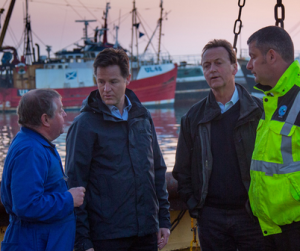 George & Clegg in Newlyn on Tuesday. Who’s thinking of throwing who overboard?
George & Clegg in Newlyn on Tuesday. Who’s thinking of throwing who overboard?So were the two at daggers drawn yesterday, Clegg holding the door open for another cruel coalition of confusion and Andrew determinedly wanting to shut it tight? Or is this just a word game? For it suits Andrew George to deny any likelihood of another deal in order to siphon off Green, Labour and MK votes in St Ives; it suits Nick Clegg to float precisely that same coalition as he desperately looks to Tory voters to save his seat in Sheffield (the one up north not near Paul).
So it suits both of them to have this little spat. Moreover, distancing himself from the toxic Clegg hardly does Andrew a disfavour. The problem is that deciphering the words of Lib Dems these days is a thankless task which makes that of the old Kremlinologists look a doddle. The Lib Dems have a record second to none in disingenuously promising one thing and then either not delivering or giving us the exact opposite.
The big unanswered question remains why Andrew still bothers to be a Lib Dem MP, especially given the way they’ve propped up the Tory project to transfer wealth from the poorest and most vulnerable to the rich and comfortably off. Wouldn’t it have been preferable to have given up the whip in 2012 or thereabouts, with time to build support as an outspoken Cornish Independent MP, rather than flirt with the very real possibility of handing the seat over to a Christian fundamentalist Tory? Which course of action – carrying on as a Liberal Democrat or becoming a real tribune for Cornwall – would gain more space in those history books of the future?

April 21, 2015
Tories panic over new Celtic problem
Spooked by emerging reports of a huge surge to MK in Cornwall, Tory grandees were tonight in panic mode, frantically warning voters of the effects of such irresponsible and lunatic behaviour. ‘This is a terrifying prospect’ said ex-PM Stanley Baldwin. Mr Baldwin had felt so strongly he’d risen from his grave to dissuade the electorate from such mischief. ‘If MK hold the balance of power its MPs will hold our wealth and power country to ransom and trigger disaster’, he said. ‘They’d make outrageous and unrealistic demands such as actually getting rid of the pasty tax or seriously recognising the Cornish as the fifth nation of the UK. Or they’ll press for advanced warnings on TV before showings of Poldark, advising viewers not to buy a second home in Cornwall’, he added.
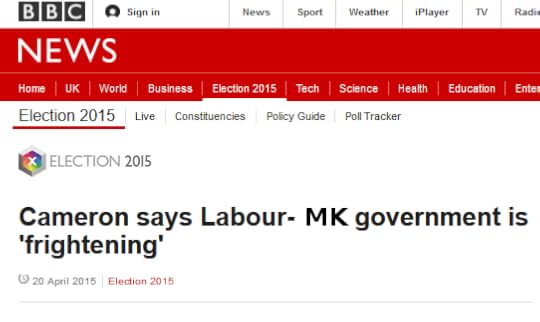 A succession of hedgefund financiers of the Tory Party phoned in from offshore tax havens in the Caribbean to point out that allowing the party that had clearly caused the economic crash of 2008 anywhere near government would result in disaster. Tory Leader David Pencameron denied any connection to Cornwall and pointed out how Milibland would be in hock to terrorists who wanted to restore the status quo ante the Charter of Pardon of 1508. ‘MK’s Dick Cole will run rings around the Labour cabinet’, he predicted. ‘I feel so strongly about this that I’ve put my surf board on e-bay.’
A succession of hedgefund financiers of the Tory Party phoned in from offshore tax havens in the Caribbean to point out that allowing the party that had clearly caused the economic crash of 2008 anywhere near government would result in disaster. Tory Leader David Pencameron denied any connection to Cornwall and pointed out how Milibland would be in hock to terrorists who wanted to restore the status quo ante the Charter of Pardon of 1508. ‘MK’s Dick Cole will run rings around the Labour cabinet’, he predicted. ‘I feel so strongly about this that I’ve put my surf board on e-bay.’
Various completely forgotten and usually totally ignored Tory peers have been dragged out of rehab and paraded in front of the main news outlets to expostulate about the mayhem and blackmail that would inevitably follow an MK presence at Westminster.
Meanwhile, BBC Spotlight’s Martyn Oates reported that as a result of the unexpected surge in support for MK England was facing its biggest crisis since the last World Cup. The delightfully coiffured political reporter was almost in tears as he reminded viewers that he’d done his best to treat MK with disdain in his election reports, describing it as a ‘so-called party of Cornwall’ and in reality a ‘Cornish nationalist party’. ‘Why? Why? How can my devoted followers be so ungrateful?’, he was heard to wail as the men in the white coats arrived.

Bernard Deacon's Blog
- Bernard Deacon's profile
- 3 followers


